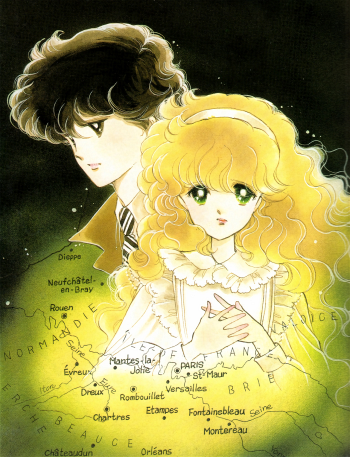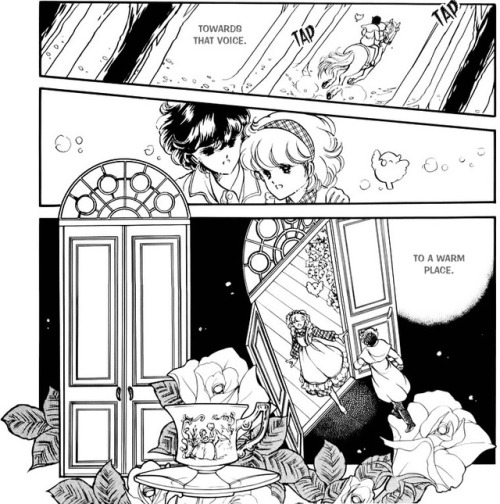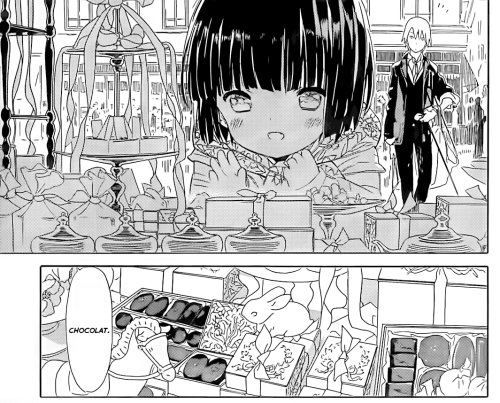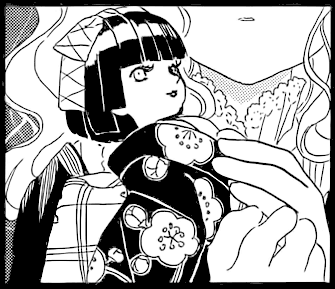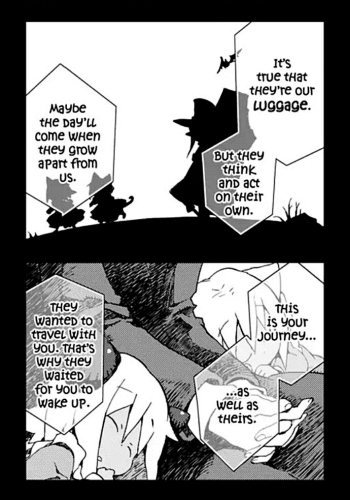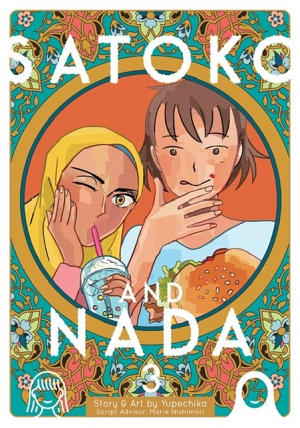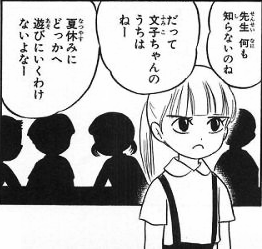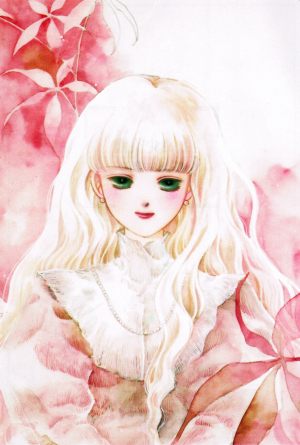Manga Recommendations I decided I'll make some recommendations for old or little-known (at least compared to modern works popular stateside) manga I've read, as well as favourites! It's mostly shoujo lately, but there's also kodomo and shounen woks, particularly Osamu Tezuka's.
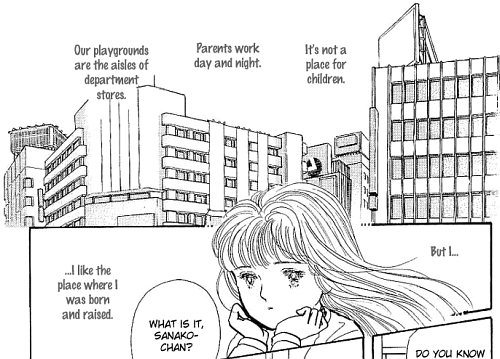 I just find it very nostalgic, epsecially given that when I was younger, I was left to freely explore outside on my own rather frequently, so that kind of very independent childhood and being a quiet child who didn't speak often, but was always watching and thinking... it's a unique perspective and I think the author handles her very well.
Rating and Content Warnings: older children to teens in Japan. Sanako has her breakfasts in a bar run by one of the other people living in the building. I don't think we see anyone partake in alcoholic drinks, but there's that. Topics such as divorce, death of loved ones, and mourning.
A lovely and unique work based on the lived experiences of the author, as well as eight other people, and their struggles and victories, growing up with developmental disorders or mental illness (one story is about depression.) I have only read the first chapter so far, which is Monsuzu's own story of growing up, forgetful, hyperfocusing on only specific things, struggling with holding down a single job for long, eventually finding someone who loves her and is patient with her forgetfulness, and having a child of her own... and only when said child is diagnosed, does she begin to realize that she, herself, also lived with ADHD, without knowing what it was. The art is clean and simple and the story is so well-written and true-to-life, it's helped others realize they might also be on the autistic spectrum, have ADHD, etc. Rating and Content Warnings: (I have not completed reading this yet, but warning for depression; the first chapter alone seems safe for older children and up, but definitely seems to be geared at adult readers)
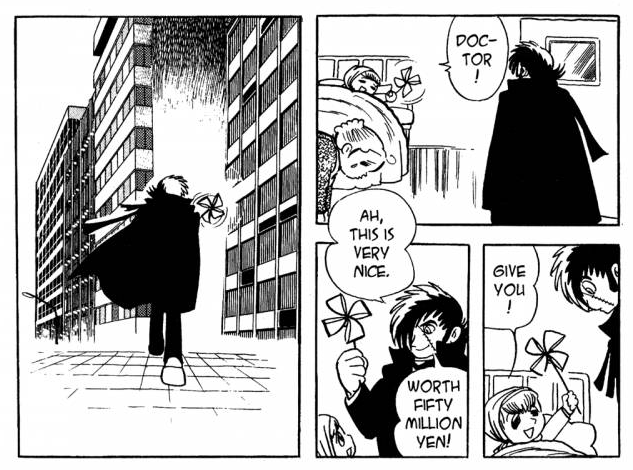 One of Tezka's most popular works, it has been adapted multiple times: a fairly-accurate, but lighter and softer, kid-friendly early 2000's TV series exists, preceded by The 4 Miracles of Life specials (closest to the manga in tone and with the style of later chapters), and followed by Black Jack 21, a more thriller/mystery-centric take with a unique anime-only overarching plotline concerning Black Jack's family and the bomb incident that scarred him... there was also a very somber and stylish OVA and film in the 90's directed by Osamu Dezaki. Rating and Content Warnings: older children to teens in Japan; despite cute style, the operations are faithfully rendered, blood, violence, and nudity, primarily in a medical context, rarely suggestive.
Another classic work from the 70's, this is a very well-researched story, based on historical events and figures from the French revolution and the period leading up to it (with a few fictional characters, namely Oscar, the second lead of the manga/principle lead of the anime), focusing on the story of the tragic Austrian-born Queen of France, Marie Antoinette, from childhood until death. Rating and Content Warnings: (older children to teens in Japan, I would say older teens to adults for the original; a poor child tries to sell herself for money to treat her sick mother (but Oscar stops and aids her); another child is nearly married off too young to an adult man to tragic ends; the main character is threatened with rape on several ocassions; a sympathetic character who later becomes a genuine love interest nearly forces himself on a main character at his lowest point but stops, is ashamed, and never repeats it; there are suggestive scenes towards the end, but never anything detailed or explicit, one of the extra chapters is more drawn out however)
 One of Tezka's most popular works, it has been adapted multiple times: a fairly-accurate, but lighter and softer, kid-friendly early 2000's TV series exists, preceded by The 4 Miracles of Life specials (closest to the manga in tone and with the style of later chapters), and followed by Black Jack 21, a more thriller/mystery-centric take with a unique anime-only overarching plotline concerning Black Jack's family and the bomb incident that scarred him... there was also a very somber and stylish OVA and film in the 90's directed by Osamu Dezaki. Rating and Content Warnings: older children to teens in Japan; despite cute style, the operations are faithfully rendered, blood, violence, and nudity, primarily in a medical context, rarely suggestive.
The story of Jeudi, a amnesiac girl found in the Alps and taken in by Lundi's aunt and uncle and given a name to match (Jeudi is Thursday and Lundi means Monday), whose only clue to her identity is a song called Alpen Rose; pursued by a cruel count obsessed with Jeudi, and together with cockatoo Printemps, Jeudi and Lundi go on a journey across Europe to uncover Jeudi's past, even as World War II breaks out. It's not very period-accurate, but the characters do meet some historical figures, and it's a tale full of charm, excitement, good messages, with a very sweet and innocent love story. This was dubbed in Arabic twice, as زهرة الجبل and as أغنية أبي
Rating and Content Warnings: older childen to teens in Japan; this story, particularly animated, is just about all-ages friendly, aside from alcohol references (a villain drinks to excess) and one scene towards the start where the two leads were huddled together undressed to share warmth for survival, with typical shoujo doll-like undetailed nudity... the couple is very young and innocent in all respects; in the manga, Jeudi flees her job at the start because the master she was sent to work with tried to force himself on her; in both anime and manga, she's pursued by an evil adult).
This is a sweet and simple story of a young, reserved Japanese girl travelling to work in France in the late 19th century. She encounters cultural shocks and meets some people who misunderstand her (either rejecting her and her different way of life entirely or comcially misunderstanding her culture while obsessing over its aesthetics). She gets to know the world around her, makes mistakes, and learns from others around her.
Rating and Content Warnings: it's mostly fluff, but there's some dark themes (Claude's complicated feelings towards his dead father, namely... Alice also walks in on her brother with a lady having a very suggestive conversation), there is a fire in which Yune suffers some burns in the manga, and the last chapters end in an unfortunate situation with the fate of the main characters left in the air (the author passed away before completing the story). The anime stops before the heaviest chapters, so it feels soft and sweet all the way through, just scratching the surface of Claude's issues with his father and the Grand Magasin.
A collection of short stories, each one following a different teenager with some sort of problem (one girl has delusions of being a six year old magical girl who transformed older and got stuck that way, one boy feels isolated from his friend, another girl has an eating disorder, etc.), that come together in a final chapter. Some start to heal in their story, others need more support which they get at the end, but overall, it's a beautiful and moving story, although it's very short. Rating and Content Warnings: I'd say 13 or 14+? It tackles problems teens face... warnings for eating disorders, violence, some blood, child sexual abuse (fortunately, the incident is not depicted at all, so no chance of sexualizing it, we only see how the event affected the character), ableism, bullying, some body horror (the artist often draws horror, it shows in the surreal chapter images), and mild nudity in a chapter cover.
A story about a mysterious traveller who carries a coffin on her back, as she travels in hopes of finding a cure. At first, she is accompanied only by Sen, whose body is made up of a thousand bats, but she soon picks up two very young girls who were experimented on and gives them a new purpose. Similar to the Kino's Journey light novels and associated media, to the point a lot of the main characters have counterparts (although Kuro is a proactive character rather than an impartial observer like Kino), Kuro often the lives of those she meets, and she is likewise changed by those she meets. 
Rating and Content Warnings: I'd say 13 or 14+? The art style is cute and story book-esque, but there is still death, trauma, some bloody scenes, body horror, and some creepy attempts at psychological manipulation. The little girls (Nijuku and Sanjuku) are young and naive and fondly remember the man who used to experiment on them
A warm and genuine series of brief vignettes in the lives of two college roommates studying in the States, a Japanese girl called Satoko and a Saudi Arabian girl called Nada. They learn about each other's way of life and are close friends, despite differences. The comedy comes from Nada's bluntness and Satoko's fretting about various things rather than misunderstandings or culture clashes between the two, giving this a more mellow and gentle atmosphere! The art is rather rough and the comics are all in 4koma format, but the story feels very genuine and honest. Rating and Content Warnings: they're college-aged girls, but I don't recall anything remotely offensive. Discussing arranged marriages and such?
An old, short story by one of my favourite artists and a big inspiration to me, Fukuyama Keiko! A little girl from a bad home gets scolded by her teacher, then finds a pencil with a note claiming the pencil is magic and can make her wishes come true if she writes them on it! Sadly, this manga is untranslated, but holespoles has summarized it for me (I can only read a few lines!) and for those who can't read Japanese, I'll sum it up on a page dedicated to it here. If you can read Japanese, please read the manga yourself here. Rating and Content Warnings: while conveyed in an innocent and clean way (typical of Fukuyama Keiko's work!) that is approachable for children and adults, it IS the story of a neglected child with alcoholic/addicted parents. Bottles litter the floor and parents smoke in her presence. They speak to her harshly.
Plant Doll (released as Dolls stateside) is an assortment of short stories about highl expensive, living dolls that subsist on love, warm milk, and cookies; they are quiet and eternally youthful (... well, most of them). They sleep until they choose an owner and usually won't let go once they pick someone! The stories are very varied and remind me of Pet Shop of Horrors (but with more happy endings!), in that there is a mysterious shop with an equally mysterious seller, selling odd "pets" or companions, and each chapter follows the experiences of humans who buy or otherwise come into possession of these dolls. The fable-like stories range from heartwarming (a woman becomes more hardworking and successful because she loves having a doll waiting for her at home to care for; a poor man bonds with a doll over both of them having been abandoned; a sickly little boy takes a doll for a companion and starts to thrive & play;), others are darker and more unsettling stories (some would even kill for the dolls; some stories have troubled children who act more like dolls than the dolls do; one defective doll seems to delight in her owner's despair), and some are tragic, others are comedic, and some are a bit of both! Rating and Content Warnings: older range of shoujo—jousei as it is geared towards adult women. There are some creepy stories with death (including that of children), murder, themes of adultery, child abandonment. Ableist slurs briefly used in one story with an implicitly autistic child who was abandoned by his mother. There is some undetailed nudity and like two suggestive scenes. One story has incestuous themes (a man purchases a doll that resembles his daughter and is attracted to said doll—it's chapter 3 of Vol. 3, skipped it, personally!). Each volume has an extra story unrelated to Plant Dolls, including ghost stories! |



